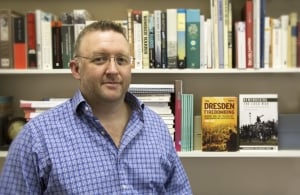Remembering war
Research news
A whole generation of Australians has grown up with a popular culture where the Russians were always “the baddies,” providing the perfect foil for heroes such as James Bond.
The Cold War affected attitudes and policies across the world for over 30 years.
Like all wars, it has played a central role in the stories that shape our sense of identity and history. It is unique, however, in the fact that it was a war that “didn’t happen at all.” It was mostly a war of propaganda, technological competitions - such as the space race – espionage, and proxy wars, with the global powers supporting their respective allies in Vietnam, Korea and Afghanistan.
Two Deakin historians, Professor David Lowe and Dr Tony Joel, trace the phenomenon of the Cold War in a book that has recently been launched, Remembering the Cold War: Global Contest and National Stories.
The authors outline the massive impact of the Cold War and its continuing effects on the modern world.
“The Cold War affected lives, affected countries and certainly shaped the politics we experience today, but - as with all stories of the past - it is important to notice what is being left in and what is being left out,” Professor Lowe said.
“This book examines societal interpretation of the past. It shows that, alongside other great episodes, the Cold War plays a swirling mixture of roles, according to each group’s needs.”
For various reasons, said Professor Lowe, there has been a resurgence of interest in the Cold War, with “people craving remembering wars.” He attributes this, in part, to our need for patriotism in the face of a more uncertain world.
“In relation to the Cold War, people are still intensely interested in the veil of secrecy, espionage and other secrets that are now being lifted,” he added. “As one example, the massive underground bunker at Greenbrier Hotel in the US was built to house the whole US congress in a nuclear emergency.”
Professor Lowe is the Director of the Alfred Deakin Research Institute (ADRI), based at the Waterfront Campus, which has just celebrated its fifth anniversary. The centre focuses on research in areas such as contemporary histories, cultural heritage and international development.
Dr Joel has further explored how war is remembered with a second book that has just been launched: The Dresden Firebombing: Memory and the Politics of Commemorating Destruction.
In contrast to the Cold War, this incident involved severe destruction. The firebombing of Dresden was the apex of the bombing war in Europe, with the death toll, the timing and the motivation for the attack having since become historiographical battlegrounds.
“Dresden was Germany’s most internationally renowned city of art and high culture,” said Dr Joel. “It was remarkable for its artistic opulence and architectural grandeur.”
On 13-14 February 1945, over 1000 aircraft, operating in three waves, dropped approximately 2,000 tons of high explosives and around 1,500 tons of incendiaries onto Dresden over 15 hours - culminating in arguably the single most devastating raid of the European bombing war.
“The war was nearly over, yet the raid targeted the cultural centre of the hitherto intact city, not the industrial surrounds, which raises serious questions about the raid’s military-strategic justifications,” Dr Joel said.
After the war, the Dresden bombing was appropriated by East Germany as a propaganda tool, then used as a theme for reconciliation following Germany’s reunification, but, in the past decade, it has been re‐appropriated by the neo‐Nazi far right, with equal numbers of leftist activists counter-demonstrating annually on the anniversary of the city’s destruction.
According to Dr Joel, local Dresdeners yearn for peace, so they can move beyond “the rubric of victimisation and sacrifice.
Share this story
 Historian and author, Dr Tony Joel.
Historian and author, Dr Tony Joel.
